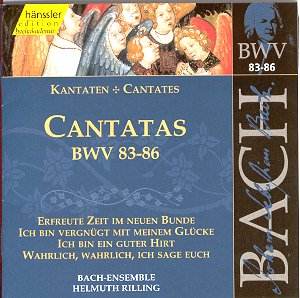JOHANN SEBASTIAN BACH
(1685-1750)
Cantatas 83-86
Cantata BWV 83 Erfreute Zeit im neuen Bunde [18.49]
Cantata BWV 84 Ich bin vergn¸gt mit meinem Gl¸cke [14.33]
Cantata BWV 85 Ich bin ein guter Hirt [18.51]
Cantata BWV 86 Wahrlich, wahrlich, ich sage euch
[15.51]
 Bach Ensemble, Helmuth
Rilling
Bach Ensemble, Helmuth
Rilling
Rec: 1978 - 1983.
 HAENSSLER CD 92.027
[68.04]
HAENSSLER CD 92.027
[68.04]
Crotchet
AmazonUK
AmazonUS
Amazon
recommendations

This recording presents four cantatas by Bach, all composed between 1724
and 1727, when Bach was in Leipzig.
It is possible that Bach based the first three movements of cantata 83 on
a lost violin concerto. Listening to the opening of the first movement, one
notices a sort of French sound to it, like a concerto movement, or an overture.
The other movements also contain a very lively tone - one example is the
tenor aria, Eile, Herz, voll Freudigkeit, sung admirably by Aldabert Kraus.
Cantata 84 opens with a plaintive oboe melody - Bach often uses the oboe
with soprano arias. This is a modest cantata; there is only one soloist,
the soprano (Arleen Augér, who is excellent), and the oboe is featured
throughout the work. The second aria, Ich esse mit Freuden mein veniges Brot,
is a fine example of Bach's best arias - the delightful joy of the soprano,
together with the oboe and violin weaving around her melody, is about as
good as it gets.
Cantata 85 is quite uneven - oddly enough, this work was recorded in three
sessions, with two and a half years between the first and the last. It opens,
as cantata 84, with a plaintive oboe melody (Bach really did like the oboe),
accompanying an aria by bass Walter Heldwein, who sounds a bit weak here.
The second aria is quite nice, with violoncello piccolo obbligato; this is
one of the few cantatas with this instrument. Unfortunately, alto Gabriele
Schreckenbach uses a bit too much vibrato for this music. The third section
is the longest of this cantata, and is scored for only two oboes, bassoon
and organ backing up soprano Arleen Augér, who is excellent.
Cantata 86 features four soloists, with arias sung by the bass, alto and
tenor (the soprano sings a recitative). The first aria, for bass, is especially
moving, and very well sung by Walter Heldwein. The second aria, Ich will
doch wohl Rosen brechen, alto (Helen Watts), is a delightful movement, with
a violin solo playing a rich, rhythmic accompaniment to the voice. This is
another of Bach's most wonderful arias.
Rilling's performances of these cantatas are, is in most of his cantata
recordings, very good. While Rilling is far from a "historically-inspired
performer", he nevertheless captures the feeling of Bach's cantatas very
well. Unlike some other cantata recordings, he has chosen to use female sopranos,
and original instruments are not essential. This gives a much different tone
than the Leonhardt/Harnoncourt recordings of Bach's cantatas, until recently
the only other complete recording of these works. But Rilling rarely disappoints,
and, for those who seek the music above "authenticity", Rilling's versions
are always a fine choice.
Another excellent recording of Bach's cantatas by Helmuth Rilling. This disc
contains four very nice cantatas, with fine soloists and very good performances
by all those involved.
Kirk McElhearn

